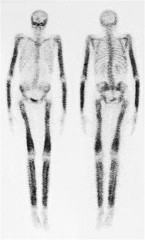Twenty million medical scans and treatments are done each year that require radioactive isotopes and scientists today described a global shortage of these life-saving materials that could jeopardize patient care and drive-up health care costs.
They spoke at a symposium at one of the opening sessions of the 240th National Meeting of the American Chemical Society, being held here this week.
 Bone scans and a variety of other medical procedures could be affected by a worldwide shortage of medical isotopes.
Bone scans and a variety of other medical procedures could be affected by a worldwide shortage of medical isotopes.
Medical isotopes are minute amounts of radioactive substances used to diagnose and treat a variety of diseases. Isotopes injected into the body can enable doctors to determine whether the heart has adequate blood flow; cancer has spread to a patient's bones; and help diagnose gallbladder, kidney, and brain disorders. When delivered into a malignant tumor, isotopes can kill the cancer cells minimizing damage to nearby healthy tissue. The shortage of radioactive isotopes also threatens activities in other areas, including basic and environmental research, oil exploration, and nuclear proliferation, the scientists noted.
"Although the public may not be fully aware, we are in the midst of a global shortage of medical and other isotopes," said Robert Atcher, Ph.D., MBA, in an interview. "If we don't have access to the best isotopes for medical imaging, doctors may be forced to resort to tests that are less accurate, involve higher radiation doses, are more invasive, and more expensive."
The shortage already is forcing some doctors to reduce the number of imaging procedures that they order for patients, he added. Atcher directs the National Isotope Development Center (NIDC), a U. S. Department of Energy unit that is responsible for production of isotopes nationwide.
Each day more than 50,000 patients in the United States receive diagnostic and therapeutic procedures using medical isotopes, particularly individuals with heart problems and cancer. Eight out of every 10 procedures require one specific isotope, technetium-99m, which has a "half-life" of only six hours. Half-life is time it takes for 50 percent of a given quantity of a radioactive substance to "decay" and disappear. Thus, like other radioactive isotopes, technetium-99m can't be stockpiled. It must be constantly made fresh, and distributed quickly to medical facilities.
Wolfgang Runde, Ph.D., who works with Atcher at the Los Alamos National Laboratory in New Mexico and presented a report on the situation here, said that an unexpected shut down of a major isotope production facility in Chalk River, Ontario, Canada, in 2009 precipitated the shortage. Los Alamos also is part of the U.S. Department of Energy. The Chalk River facility was scheduled to restart this summer but remained closed as of early August. The Chalk River facility produces 50 percent of the U.S. supply of the isotope used to make technetium-99m. Production problems occurred at other isotope facilities, compounding the problem. Remaining isotope suppliers have not been able to make-up for the resulting shortage, leaving the United States in an isotope supply crunch.
"Shortage of this key medical isotope makes it more difficult to carry out important medical procedures, such as finding out whether cancer has spread to the bones," Atcher said. "Doctors have been trying everything they can think of to meet the needs of patients, including the use of other less-than-ideal isotopes, but it has been a real struggle."
Atcher also noted that the United States is highly dependent on foreign suppliers of medical isotopes. Only about 10-15 percent of the isotopes used in medicine are produced domestically. The nuclear medicine community has been pressuring the U.S. government to develop improved domestic capability for producing these materials to reduce this dependence, Atcher said.
Medical isotopes aren't the only isotopes in short supply, Atcher noted. Helium-3, for instance, is a non-radioactive isotope with multiple uses, including efforts to develop nuclear fusion reactors and monitoring to prevent illegal nuclear material from being smuggled into the U.S. Another, californium-252, which is used for oil exploration, to help start-up nuclear power reactors, and in mass spectroscopy, a mainstay analytical tool in chemistry, astronomy, and other fields of research.
"The challenge we have is to produce enough materials to meet commercial needs as well as needs of the research community - from nuclear physics, to environmental research, to medical research - amid increasing demands and fewer isotope sources" Atcher said. "The long-term solution to this crisis remains to be seen."
The American Chemical Society is a non-profit organization chartered by the U.S. Congress. With more than 161,000 members, ACS is the world's largest scientific society and a global leader in providing access to chemistry-related research through its multiple databases, peer-reviewed journals and scientific conferences. Its main offices are in Washington, D.C., and Columbus, Ohio.